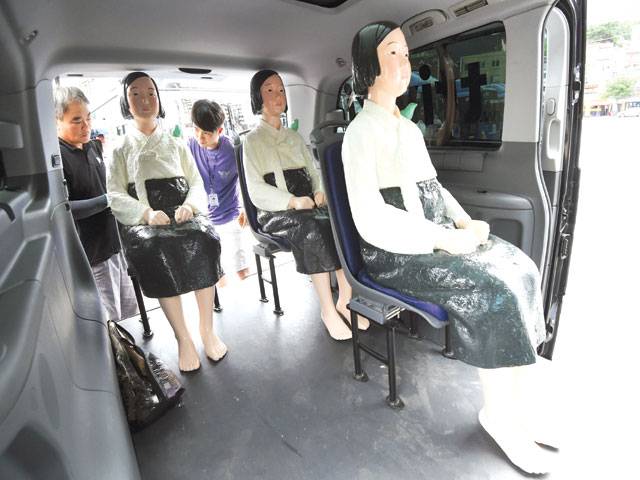SEOUL - Buses installed with a statue symbolising South Korea’s wartime sex slaves began running through the capital Seoul on Monday, a day before the anniversary of independence from Japan’s 1910-45 occupation.
Mainstream historians say up to 200,000 women, mostly from Korea but also other parts of Asia including China, were forced to work in Japanese military brothels during WWII. The plight of the “comfort women” is a hugely emotional issue that has marred ties between the two Asian neighbours for decades. Activists have in recent years set up dozens of statues - typically a young, barefoot girl wearing a traditional hanbok outfit with her hands on her knees - in public venues as a symbol of the victims.
The statues have drawn the ire of Tokyo, which has pressed for the removal of one of them outside its embassy in Seoul after Japan signed a deal with South Korea in December 2015 offering an apology and $9m to open a foundation for those sex slaves still alive.
But the city bus company said it wanted to install statues on five buses running through downtown Seoul to keep the women’s memory alive.
“It is designed to remind South Koreans of suffering the women went through,” said Rim Jin-Wook, the head of Dong-A Traffic Service that organised the event.
“We wanted to urge people not to forget our painful history,” he said, adding the statues would be removed in late September and sent to other public venues for permanent display.
The buses, whenever they pass by the Japanese embassy in central Seoul, play brief explanations about the wartime sex slaves over their audio systems.
“It’s so heartbreaking to see this girl statue partly because she looks about my age,” Jennifer Lee, a 19-year-old college student, told AFP.
“It horrifies me just to imagine what these women went through.”
Last month, the new South Korean government under President Moon Jae-In launched a task force to investigate potential problems in the deal with Tokyo concerning the comfort women.
Reached by the administration of ousted President Park Geun-Hye, the agreement was condemned by some of the women and activists who took issue with Japan’s refusal to accept legal responsibility and questioned the sincerity of its apology.
Activists are now pushing for Seoul to designate August 14 - a day before the anniversary of the country’s independence - as a state memorial day for former comfort women.






